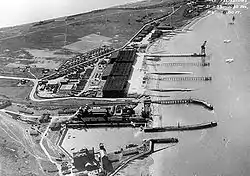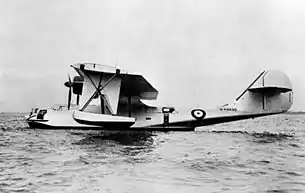RAF Felixstowe
Royal Air Force Felixstowe, or more simply RAF Felixstowe, is a former Royal Air Force station located 2.7 miles (4.3 km) northeast of Harwich, Essex, England and 10.7 miles (17.2 km) southeast of Ipswich, Suffolk.
| RAF Felixstowe | |
|---|---|
| Felixstowe, Suffolk | |
 Aerial view, 1933. | |
 RAF Felixstowe Location within Suffolk | |
| Coordinates | 51.945°N 1.321°E |
| Type | Royal Air Force station |
| Site information | |
| Owner | Air Ministry |
| Controlled by | |
| Site history | |
| In use | April 1918-April 1962 |
| Battles/wars | First World War Second World War |
History

Felixstowe was commissioned 5 August 1913 under the command of Captain C. E. Risk, RM as Seaplanes, Felixstowe, followed by Lieutenant C. E. H. Rathborne, RN in 1914 and Lieutenant-Commander John Cyril Porte, RN in 1915. RNAS Felixstowe was created soon after the outbreak of World War I following the formation of the Royal Naval Air Service, 1 July 1914.
On formation of the Royal Air Force 1 April 1918, the unit was renamed the Seaplane Experimental Station, Felixstowe and disbanded in June 1919. 'C', 'D' and 'E' Boat Seaplane Training Flights were all formed on 8 August 1918 and were disbanded during 1919 with no known aircraft operated while at Felixstowe.[1][2][3]
Notable members of the RAF were based at Felixstowe, including, among others, Frank Whittle, credited with the invention of the turbojet engine, and T.E. Lawrence, commonly known as Lawrence of Arabia.[4]
RAF Felixstowe closed 21 June 1962.
The following units were posted here:
- No. 22 Squadron RAF[5]
- No. 209 Squadron RAF[6]
- No. 210 Squadron RAF[6]
- No. 230 Squadron RAF[7]
- No. 231 Squadron RAF[7]
- No. 232 Squadron RAF[7]
- No. 247 Squadron RAF[8]
- No. 4 (Communication) Squadron RAF[9]
- No. 26 Air/Sea Rescue Marine Craft Unit RAF[10]
- No. 33 Air/Sea Rescue Marine Craft Unit RAF[10]
- 76th (Operations) Wing RAF[10]
- No. 85 Maintenance Unit RAF[10]
- No. 327 (Flying Boat) Flight RAF[11]
- No. 328 (Flying Boat) Flight RAF[11]
- No. 329 (Flying Boat) Flight RAF[11]
- No. 330 (Flying Boat) Flight RAF[11]
- No. 333 (Flying Boat) Flight RAF[11]
- No. 334 (Flying Boat) Flight RAF[11]
- No. 335 (Flying Boat) Flight RAF[11]
- No. 336 (Flying Boat) Flight RAF[11]
- No. 337 (Flying Boat) Flight RAF[12]
- No. 339 (Flying Boat) Flight RAF[12]
- No. 341 (Flying Boat) Flight RAF[12]
- No. 442 (Seaplane) Coastal Flight RAF[13]
- No. 1103 Marine Craft Base Unit RAF[10]
- No. 1103 Marine Craft Unit RAF[10]
- America School RAF[10]
- Far East Flight RAF[14]
- Flying Boat Development Flight RAF[15]
- High Speed Flight RAF[16]
- Marine Aircraft Experimental Unit[17] became Marine Aircraft Experimental Establishment (MAEE)[18]
Current use
The site is now the Port of Felixstowe,[10] with nothing remaining of the hangars, slipways and jettys.[19]
References
Citations
- Lake 1999, p. 41.
- Lake 1999, p. 56.
- Lake 1999, p. 57.
- "Former RAF base remembered". Ipswich Star. 16 March 2010. Retrieved 28 February 2019.
Those who served at RAF Felixstowe included Flying Officer Frank Whittle, inventor of the jet engine, and Aircraftsman 1st Class TE Shaw, better known as Lawrence of Arabia.
- Jefford 1988, p. 32.
- Jefford 1988, p. 70.
- Jefford 1988, p. 74.
- Jefford 1988, p. 77.
- Lake 1999, p. 52.
- "Felixstowe". Airfields of Britain Conservation Trust. Retrieved 29 October 2013.
- Lake 1999, p. 73.
- Lake 1999, p. 74.
- Lake 1999, p. 77.
- Lake 1999, p. 66.
- Lake 1999, p. 101.
- Lake 1999, p. 130.
- Lake 1999, p. 137.
- Lake 1999, p. 136.
- Trippitt, Mike (22 May 2018). "The fascinating history behind Felixstowe's flying boats". East Anglian Daily Times. Retrieved 8 June 2018.
External links
- Sea-Plane Launching Apparatus: Film of a Short S.8/8 Rangoon flying boat demonstrated to the press at RAF Felixstowe.
